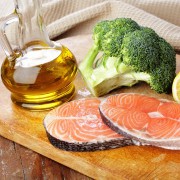 Photo: Getty Images
Photo: Getty Images
There was a time when all fatty foods were considered “bad for you.” The term “low-fat” is now almost an expected description on a food label. What does “low-fat” mean on a food label? Is the product also “low-calorie” and healthy? How much fat do I need in my diet?
Here's the "skinny" on eating fats:
1. First, you need fats (one of the macronutrients) in your diet for your body to function properly. Get about 20 percent of total daily calories from fats. Eat as little or no trans fats or saturated fats as you can. Eating too many (and too often) trans fats and saturated fats will land you in the doctor's office with heart and cholesterol problems.
2. Focus mainly on eating heart-healthy unsaturated fats. Monounsaturated fats (MUFAs) can lower bad cholesterol (LDL) and lower total cholesterol. Good sources of MUFAs are nuts (especially raw), nut butters, olives, olive oil, avocados, safflower oil, peanut oil and canola oil.
3. Polyunsaturated fats (PUFAs) are also good for you---especially the omega-3 fats found in cold-water fatty fish like salmon, mackerel, herring, sardines, trout and white tuna. Flaxseed and walnuts are also good sources of omega-3 fats. Eat more omega-3 fats and less omega 6 fats.
Too much omega 6 fat intake can lead to inflammation that causes arthritis, cancer and heart disease. Sources of omega-6 fats are soybean oil, sunflower oil, peanut oil, corn oil, sesame oil and cottonseed oil. Conjugated linoleic acid(CLA) fats found in red meat and dairy are also good for you provided they come from grass-fed cattle. Another option would be to supplement your diet with fish oil.
4. Limit eating saturated fats. Some sources of saturated fats are beef, poultry, pork, dairy, lard, cocoa butter, coconut oil and palm oil. Moderation is the key to eating saturated fats. Dark chocolate has become popular for its disease-fighting antioxidant qualities. So, I guess it would be a good "cheat food" (but not too much!).
5. Severely limit trans fats. Manufacturers of food love trans fats because they extend the shelf-life of food products and make them taste great. You've heard me say this--"if it's fried, let it slide." Let these bad boys go too---fast foods, chips, cookies, packaged pastries, hydrogenated margarine and shortening. Some fast food chains have started to cut out trans fats. Check out their websites to see the nutritional breakdown of different restaurants.
6. Count the calories with fatty foods just like any other food. For example, nuts are good for you but they are loaded with calories. A handful of raw almonds will do the trick for you!
Go ahead and eat the right fatty foods. They will help you reach your health, weight loss and fat loss goals.
Mark Dilworth, BA, PES, CPT is a Certified Personal Trainer and former NCAA Division I athlete. Mark is the owner of My Fitness Hut, Her Fitness Hut and Sports Fitness Hut. Mark’s Fat Blaster Athletic Training System has been proven to give his clients the fit, sculpted and athletic-type bodies they want. Visit Mark’s main site:
Your Fitness University http://yourfitnessuniversity.com





Add a Comment1 Comments
Even though coconut oil is loaded with saturated fat, it's not necessarily a bad thing. The saturated fat in coconut oil contains medium chain triglycerides and is treated differently in the body.
November 9, 2010 - 8:50pmIf you do your research, you’ll find that the fat in coconut oil is treated a lot like carbohydrates so it’s burned straight away rather than stored.
It also helps shift your metabolic rate into high gear, so a tablespoon of this stuff two-three times a day really does help you lose weight.
I’ve been taking three tablespoons a day for the past month and have lost an entire dress size. I haven’t changed my eating habits either. Plus, it gives you the most amazing energy boost and sense of wellbeing.
This Comment